新版译林九年级下册英语知识点总结一
译林九年级英语下册知识点

译林九年级英语下册知识点一、语法知识点1. 一般现在时一般现在时表示经常性或习惯性的动作、状态或真理。
例句:- I often go for a walk in the park.我经常在公园散步。
- The sun rises in the east.太阳从东方升起。
2. 一般过去时一般过去时表示过去发生的动作或情况。
例句:- She lived in London for two years.她在伦敦住了两年。
- They went to the beach last summer.他们去年夏天去了海滩。
3. 现在进行时现在进行时表示现在正在进行的动作。
例句:- We are watching a movie right now.我们正在看电影。
- He is studying for the exam at the moment.他此刻正在为考试而学习。
4. 一般将来时一般将来时表示将来要发生的动作或存在的情况。
例句:- We will visit our grandparents next weekend.我们下周末会去看望祖父母。
- She is going to travel to Japan next month.她下个月将要去日本旅行。
5. 定语从句定语从句用来修饰一个名词,并且在句中担当定语的作用。
例句:- The book that I am reading is very interesting.我正在读的那本书非常有趣。
- The girl who won the competition is my friend.赢得比赛的那个女孩是我的朋友。
二、词汇知识点1. 动词短语固定动词短语是英语中常用的固定搭配,掌握这些短语可以丰富表达方式。
例句:- give up (放弃)She didn't give up easily and finally achieved her goal.她没有轻易放弃,最终实现了她的目标。
牛津译林版九年级下册英语Unit1词组汇总

牛津译林版九年级下册英语Unit1词组汇总Welcome1.The great wall is amazing, isn’t it?长城真壮观,不是吗?No ,it isn’t不,才不是呢2 I t’s tiring to climb the steps爬这些台阶真累人3.my feet hurt 我的脚痛4.take/have a rest 休息5.I’m taking a rest.我要休息6.There ‘s still a long way to go仍然有很长一段路要走7.keep moving 继续走8.go on 继续9.go on to do sth 继续做-----10.go on doing sth 继续做-11.wake sb up (woke/woken)叫醒某人12.wake up 醒来13.on one’s way back在某人回来的路上14.on one’s way back home/there/here在某人回家、那里、这里的路上15.on one’s way home /to school在某人回家、上学的路上16.make sb amazed/surprised/excited 使某人惊叹/ 吃惊/兴奋17.think/find it tiring/amazing/surprising to do sth 认为、发现做------是------18.plan to travel around China 计划周游中国19.Since you are in Beijing now, why not /don’t you start from here.既然你现在在北京,为啥不从这儿开始20.wonderful places to go 可去的美丽之地21.What special things can I see in Beijing. 在北京我可以看到啥特别的东西22.a kind of traditional Chinese art 一种传统的中国艺术23.one of the most popular arts 最流行的艺术之一24,go and enjoy it 去欣赏它25.Thank you for your suggestions 谢谢你的建议26.seggest-suggestion(s)27.suggest sth to sb 把----建议给----28.suggest doing sth 建议做-----29.advise sb to do sth 建议某人做------Reading30.the capital of China 中国的首都31.in the middle of the ancient city of BeiJing is--- --在北京古城中心的是------32.In front of the building are two trees 在大楼前面的是两棵树e d to live there 过去住在那里34.be sued to living there 习惯住在那里35.turn----into----- 把-----变成/改造成-------36.be turned into -----被变成-/改造成------37.It was turned into a museum in 1925. 在1925年它被改造成博物馆38.with wonderful buildings and art treasures inside, it is well worth a visit因为里面有宏伟的建筑和艺术珍宝,非常值得一游39.be well worth visiting/a visit 很值得一游40.with the development of modern medicine, more and more diseases can be cured.随着现代医学的发展,越来越多的疾病可以被治愈41. Next to-----is /are------- ----的隔壁是------42.the biggest square in the world 世界上最大的广场43.Many tourists like to gather there early in the morning to watch the raising of the national flag 许多游客喜欢一大早聚集在那里看升国旗44.in the north-west of Beijing is ------- 在北京的西北是-----45.a large garden set in a natural landscape 一座置于自然风景中的大花园46.It was once a nice place for the emperors to spend the summer 它曾经是皇帝避暑的地方ed to be a place for the emperors to spend the summer 过去是皇帝避暑的地方48.It runs for over 6,000kilometers across northern China, with watchtowers every few hundred meters它在中国北部地区绵延6000公里,每隔几百米设有瞭望塔49.the wall was first built more than (over)2000 years 这座墙首次在2000年前被造50.one of the wonders of the world 世界奇迹之一51.East or west, Guilin landscape is best 桂林山水甲天下East or west, home is best. 金窝银窝,不如自己的草窝!52.really a beautiful city in southern China 在华南真的一个美丽的城市53.lie on two sides of the Lijiang River 位于漓江两岸His books are lying all over his desk 他的书摊得满桌都是lie about her age 谎报她的年龄tell a lie/lies 说谎54.all around the city 环绕全城55.mountains stand in different shapes 群山耸立,形态各异56.in north-west of the city 在这座城市的西北57.It is amazing that there are so many rocks in unusual shapes.有如此多造型奇特的石头,真是叹为观止58.Some hang down, and other point upwards 一些向下悬垂,还有的向上延展59.The cave is praised as -------- 此洞被誉为--------60.be praised as----- 被誉为----61.Take a boat trip along the Lijiang River 乘船游览漓江62.It is also popular to hire a bicycle and ride around the countryside租一辆自行车并绕乡村骑行也很流行63.Ihope you can visit my city one day 希望有一天你可以来我的城市参观64.raise the price of---- 提升---价格65.The price of ----has risen - --价格已涨了66.It is open to the public as a museum 作为一座博物馆像民众开放67.has been open to the public for over ten years 已向民众开放10多年了68.As an old saying goes ,”He who has never been to the Great Wall is not a true man”正如俗话所说“不到长城非好汉”Grammar69.It is 22February.we left Beijing for Shanghai 二月22号我们离开北京去上海70.leave-----for----- 离开------去------71.leave for----- 动身去--------72.leave Beijing for Shanghai 离开北京去上海73.leave forNanjing 动身去南京71.It is about 1300 kilometers from Beijing to Shanghai. 北京离上海大约1300公里72.It was at 5a.m when I woke up this morning. 今早我大约5点起床73.In winter, it is very cold and dry in Beijing. 北京的冬天非常冷74.on a sunny day 在晴朗的一天75.It was at noon when we got to our hotel. 我们在中午到达我们的旅馆76.It is far from my home to my school 我家离学校很远77.It is 3kilometers away from my home to my school 我家离学校3公里远78.three quarters=three fourths 3/479.one/a fifth ( two fifths) 1/5(2/5)80.a/one half 1/281.one/a fourth=a quarter 1/482.Across the lake is a 17-hole bridge=A 17-hole bridge is across the lake 一座17孔桥跨越湖面83.on both sides of 在-----两边84.on each/either side of 在----每一边85.It is +形容词+(of/for---)+to--- 做----对---来说真是--------86.It takes ---some time to --- 做----花-------时间87.It is said/reported/---that---- 据说/据报道88.---think(s) find(s) it + 形容词---to --- 认为/发现做-----是---------89.I don’t think the pollution is as serious as I imagined 我认为污染没我想象得严重90.It is fun to ride around the city 骑车周游这个城市是快乐的91.a trip to----=a visit to--- 一次-----之旅92.a tour of---- 一次-----之旅93.take a tour of---- 参观/到----旅游94.an ancient city of culture 一座文化古城95.Japan’s highest mountain 日本最高的山96.on the first/second/ third---- day 在第-----天97.during one’s stay in---- 某人呆在-----期间98.an ancient city called---- 一座叫-----古城99---.It’s very small, isn’t it? 它很小,不是吗?----Yes ,it is 是的,它很小100.It’s a city state 它是一个城市国家101.It’s in South East 它在东南亚102.What languages do they speak? 它们说啥语言?103.speak both English and Chinese. 既说英语也说汉语104.English is used as a second language 英语被用作为第二语言105.India has the second largest population. 印度的人口世界第二106.China has the largest population in the world 中国是世界上人口最多的国家106.India is a great country /wonderful place to visit 印度是个游览的好国家、好地方107.It lies in South Asia 它位于南亚108.It’s near/next to----- 它在-----附近109.Its capital city is------ 它的首都城市是------110.People in India mainly speak Hindi 印度人主要说印地语111.It is not difficult to communicate with the local people 和当地人交流不难112.It is famous for IT industry 它因IT业出名9B Unit1Welcome1长城真壮观,不是吗?不,才不是呢2爬这些台阶真累人3.我的脚痛4.t 休息5. 我要休息6.仍然有很长一段路要走7. 继续走8继续9继续做-----10继续做-11 叫醒某人12 醒来13.在某人回来的路上14在某人回家、那里、这里的路上15 在某人回家、上学的路上16.使某人惊叹/ 吃惊/兴奋17认为、发现做------是------18计划周游中国19.既然你现在在北京,为啥不从这儿开始20可去的美丽之地21在北京我可以看到啥特别的东西22一种传统的中国艺术23最流行的艺术之一24.去欣赏它25.谢谢你的建议26.suggest27 把----建议给----28. 建议做-----29. 建议某人做------Reading30.中国的首都31--在北京古城中心的是------32. 在大楼前面的是两棵树33. 过去住在那里34 习惯住在那里35 把-----变成/改造成-------36. ----被变成-/改造成------37. 1925年它被改造成博物馆38.因为里面有宏伟的建筑和艺术珍宝,非常值得一游39.很值得一游40.随着现代医学的发展,越来越多的疾病可以被治愈41. ----的隔壁是------42世界上最大的广场43许多游客喜欢一大早聚集在那里看升国旗44. 在北京的西北是-----45一座置于自然风景中的大花园46.它曾经是皇帝避暑的地方47.过去是皇帝避暑的地方48.它在中国北部地区绵延6000公里,每隔几百米设有瞭望塔49.这座墙首次在2000年前被造50.世界奇迹之一51.桂林山水甲天下金窝银窝,不如自己的草窝!52.在华南真的一个美丽的城市53. 位于漓江两岸他的书摊得满桌都是谎报她的年龄说谎54.环绕全城55. 群山耸立,形态各异56 在这座城市的西北57有如此多造型奇特的石头,真是叹为观止58一些向下悬垂,还有的向上延展59. 此洞被誉为--------60. 被誉为----61. 乘船游览漓江62.租一辆自行车并绕乡村骑行也很流行63. 希望有一天你可以来我的城市参观64 提升---价格65. -价格已涨了66. 作为一座博物馆像民众开放67. 已向民众开放10多年了68正如俗话所说“不到长城非好汉”Grammar 69二月22号我们离开北京去上海70 离开------去------71动身去--------7离开北京去上海73. 动身去南京71.北京离上海大约1300公里72. 今早我大约5点起床73.北京的冬天非常冷74在晴朗的一天75我们在中午到达我们的旅馆76我家离学校很远77我家离学校3公里远78. 3/479 1/5(2/5)80. 1/281. 1/482 一座17孔桥跨越湖面83. 在-----两边84 在----每一边85做----对---来说真是--------86.做----花-------时间87 据说/据报道88.- 认为/发现做-----是---------89 我认为污染没我想象得严重90. 骑车周游这个城市是快乐的91一次-----之旅92.一次-----之旅93参观/到----旅游94一座文化古城95 日本最高的山96.在第-----天97.某人呆在-----期间98.一座叫-----古城99--- 它很小,不是吗?----是的,它很小100.它是一个城市国家101 它在东南亚102.它们说啥语言?103.既说英语也说汉语104英语被用作为第二语言105 印度的人口世界第二106.中国是世界上人口最多的国家106.印度是个游览的好国家/好地方107它位于南亚108.它在-----附近109. 它的首都城市是------110. 印度人主要说印地语111.和当地人交流不难112.它因IT业出名。
牛津译林版九年级下册英语Unit 1-4知识点总结
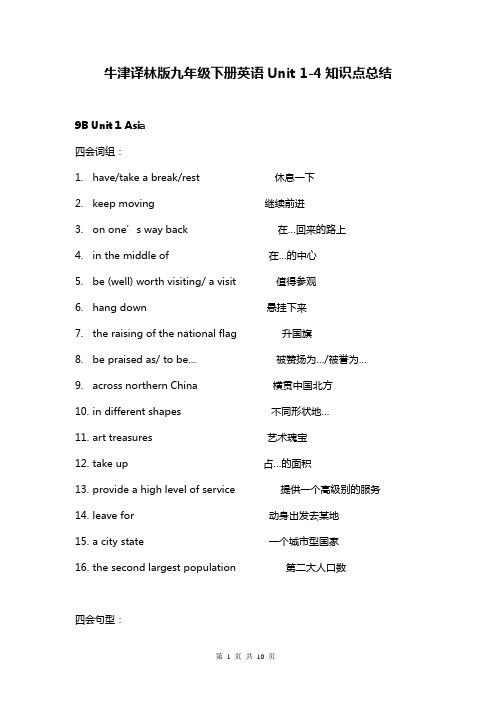
牛津译林版九年级下册英语Unit 1-4知识点总结9B Unit 1 Asia四会词组:1.have/take a break/rest 休息一下2.keep moving 继续前进3.on one’s way back 在…回来的路上4.in the middle of 在…的中心5.be (well) worth visiting/ a visit 值得参观6.hang down 悬挂下来7.the raising of the national flag 升国旗8.be praised as/ to be…被赞扬为…/被誉为…9.across northern China 横贯中国北方10.in different shapes 不同形状地…11.art treasures 艺术瑰宝12.take up 占…的面积13.provide a high level of service 提供一个高级别的服务14.leave for 动身出发去某地15.a city state 一个城市型国家16.the second largest population 第二大人口数四会句型:1.It’s tiring to climb the steps, and my feet hurt.爬台阶很累人,我的脚疼。
2.We had better keep moving.我们最好继续前进。
3.Thank you for your advice/ suggestion.谢谢你的建议。
4.With wonderful buildings and art treasures inside, it is well worth avisit.它里面有宏伟的建筑和艺术珍宝,非常值得一游。
5.It runs for over 6000 kilometres across northern China, with watchtowers every few hundred metres.6.它(长城)在中国北部地区绵延6000多公里,每隔几百米设有瞭望塔。
九年级英语下册第一单元知识点

九年级英语下册第一单元知识点知识是人们前进的最大动力,因为有知识,我们知道我们从哪里来,也知道我们将要到哪里去。
下面小编给大家分享一些牛津译林九年级下册第一单元知识点,希望能够帮助大家,欢迎阅读!九年级英语下册第一单元知识1【重点短语】1. have conversation with sb. 同某人谈话2. too…to… 太……而不能3. the secret to… ……的秘诀4. be afraid of doing sth./ be afraid to do sth. 害怕做某事5. look up 查阅6. repeat out loud 大声跟读7. make mistakes in 在……方面犯错误8. connect ……with… 把……和……连接/联系起来9. get bored 感到厌烦10. be stressed out 焦虑不安的11. pay attention to 注意;关注12. depend on 取决于;依靠13. the ability to do sth.. 做某事的能力九年级英语下册第一单元知识2【考点详解】1. by + doing 通过……方式(by是介词,后面要跟动名词,也就是动词的ing形式)2. talk about 谈论,议论,讨论The students often talk about movie after class. 学生们常常在课后讨论电影。
talk to sb= talk with sb 与某人说话3. 提建议的句子:①What/ how about +doing sth.? 做…怎么样?(about后面要用动词的ing形式,这一点考试考的比较多)如:What/ How about going shopping?②Why don t you + do sth.? 你为什么不做…?如:Why don t you go shopping?③Why not + do sth. ? 为什么不做…?如:Why not go shopping?④Let s + do sth. 让我们做…...吧。
牛津译林版九下Unit1知识点总结梳理
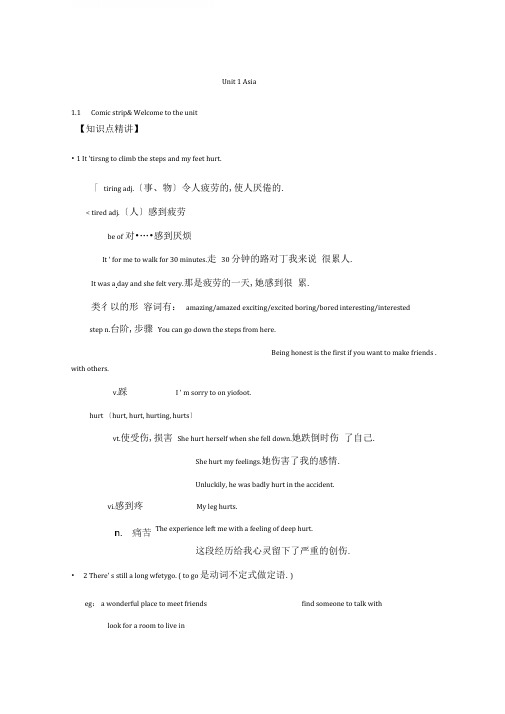
Unit 1 Asia1.1Comic strip& Welcome to the unit【知识点精讲】• 1 It 'tirsng to climb the steps and my feet hurt.「tiring adj.〔事、物〕令人疲劳的,使人厌倦的.< tired adj.〔人〕感到疲劳be of对•…•感到厌烦It ' for me to walk for 30 minutes.走30 分钟的路对丁我来说很累人.It was a day and she felt very.那是疲劳的一天,她感到很累.类彳以的形容词有:amazing/amazed exciting/excited boring/bored interesting/interestedstep n.台阶,步骤You can go down the steps from here.Being honest is the first if you want to make friends . with others.v.踩I ' m sorry to on yiofoot.hurt 〔hurt, hurt, hurting, hurts〕vt.使受伤,损害She hurt herself when she fell down.她跌倒时伤了自己.She hurt my feelings.她伤害了我的感情.Unluckily, he was badly hurt in the accident.vi.感到疼My leg hurts.The experience left me with a feeling of deep hurt.这段经历给我心灵留下了严重的创伤.• 2 There' s still a long wfetygo. ( to go 是动词不定式做定语.)eg: a wonderful place to meet friends find someone to talk with look for a room to live in1)He is always the first person(come) and the last one (leave ).2)There are many interesting books( choose ) from, but I don ' t know which to borrow.3)There is nothing(worry )about.• 3 We had better keep moving.①had better do sth.表示“最好做某事〞,表示劝告、建议或者愿望,否认形式是在had better后面加上not.例如:You' d better have a rest.You' d better not miss the last bus.②keep (on) doing sth意为“继续做某事、重复做某事〞.They kept talking about it.• 4 J go on to do 一事做完,接着做另一件事go on doing 事情暂停后继续做;一直做某事go on with后接名词或代词1)After a short break ,he went on(read) the rest of the text.2)After reading the novel , he went on(write) an article.• 5 wake v. (woke, waken, waking, wakes) adj. awakewake up your sister wake (me/him/her/them/you …)up• 6 Tian ' anmen Square, the Palace Museum and the Great Wall are wonderful places to go.to go这里是动词不定式作后置定语,修饰wonderful places.不定式作后置定语时,不定式与所修饰的名词之间往往有动宾关系, 如果不定式是不及物动词,动词不定式后面要加上必要的介词.We want some water to drink.He is a pleasant fellow to work with.1.2Reading【知识点精讲】• 1 In the middle of the ancient city of Beijing is the Palace Museum, also called the Forbidden City.①in the middle of表示“在...... 中间〞.What can you see in the middle of the picture?The teacher is standing in the middle of us.②called此处为动词的过去分词作定语,意为“被称为、被叫作〞,与named同义.例如:This is a book named/calledJourney to the WestThe Greens have a daughter named/called Kate.•2The emperors of the Ming and Qing dynasties used to live there.used to do sth.过去常常做某事〞,暗含现在不再〞之意,后接动词原形,疑问形式可以直接将used 提到句首,或者借助助动词did;否认式可以直接在used后面加not,或者用didn't【辨析】be /get used to doing sth., used to do sth.与be used to do sth.be /get used to doing sth. 习惯丁做某His father is used to watching TV before going to bed.事The boy used to play computer games.used to do sth. 过去经常做杲事More and more wood is used to make paperbe used to do sth.被用来做某事• 3 With wonderful buildings and art treasures inside , it is well worth a visit.①with复合结构" with+宾语+宾语补足语〞在句中作状语,表示伴随、原因、时间、条件、方式等.作宾语补足语的可以是形容词、名词、副词、介词短语、现在分词、过去分词或者动词不定式.He stood before his teacher with his head down.She said goodbye with tears in her eyes.He fell asleep with the lamp burning.I can ' t go out with all these clothes to wash.②be worth后常接名词或者动名词,表示“值...... 〞.The new car is worth at least 1 million.The novel is worth reading once more.• 4 Many tourists like to gather there early in the morning to watch the raising of the national flag.:rise raiserise 不及物动词上升〞The water in the river rose after the heavy rain. The sun rises in the east and sets in the west.rais e 及物动词E提升, 筹集,才口同, 举起〞The worker want the boss to raise their wages.The teacher asks us to raise our hands if we have questions.We should try our best to raise more money for the poor family.• 5 It is one of the wonders of the world.wonder作名词,意为“奇迹〞,常用的句型有:①It ' s a wonder that.为“奇怪的是 ........ 〞It ' s a wonder that she is still alive.②It 'no wonder that..点为“难怪 ....... 〞.It ' s no wonder that they won ' t come.【拓展】wonder用作及物动词,意为“想知道,对...... 好奇〞,常见的用法有:①后接who, what, why, where, when, how, which引导的宾语从句.She wondered what the child was doing.②后接if和whether引导的宾语从句.She wondered whether you were free that morning.③后接“疑问词+不定式〞构成的短语.I ' m just wondering how to do it.• 6 It lies on the two sides of the Lijiang River.动词lie表示“躺、位丁、撒谎〞lie 〔躺、位丁〕一lay 〔过去式〕一lain 〔过去分词〕-lying 〔现在分词〕lie 〔撒谎〕一lied 〔过去式〕一lied 〔过去分词〕-lying 〔现在分词〕lay 〔放置、下蛋〕一laid 〔过去式〕一laid 〔过去分词〕-laying 〔现在分词〕•7 ..some hang down, and others point upwards.①hang意为“悬:挂〞,过去式和过去分词都是hung, hang表示“上吊〞时,过去式和过去分词是hangedThis picture is hung on the wall.The man was hanged for murder.②point作动词,意为“指、指向〞常用的短语有point out"指出、指明〞;point to意为“指向〞,强调方向;point at表示指着某一个物体,指人时一般表示粗鲁或者不礼貌.He pointed to the door and there I saw a girl smiling at me.The teacher pointed at the map and told where Britain was.1.3Grammar【知识点精讲】• 1 The lake is very big -it takes up three quarters of the area.①take up意为“占据空间、占用时间〞.He has taken up a position in the centre of the room.I know how busy you must be and I wouldn ' t want to take up too much of your time.②quarter作名词,意为“四分之一〞.Three quarters of the students are boys.• 2 There are many tone lions on either side of it.either表示两者中的任何一个〞,做主语时,谓语动词常用单数形式,起其后可接of短语.You can come on Saturday or Sunday. Either is OK for me.We can't care much for what to eat. Either of the two will do.neither表示两者都不〞,做主语时,谓语动词常用单数形式,其后可接of短语. We have red and yellow Tshirts. Which color do you like?Oh, neither. I think blue will be OK.Neither of them wants to speak to him about this matter.• 3 They provide a high level of services .service作名词,意为“效劳〞,动词形式为serv&We all complain about the poor services of the hotel.Children must be educated to serve their country when they grow up.【语法精讲】代词it的用法1.it作人称代词的用法(1)指事物.it可指代除人以外的一切事物或动物.例如:—Where is the cat猫在哪?—It' s in the bedroom 它在卧室里.(2)指人.it可用丁指代性别不明的婴儿或用丁确认某人的身份.例如:Is it a boy or a girl?是男孩还是女孩?There is a knock on the door.It must be the postma^t人在敲门.一定是邮递员.(3)代替某些代词.it还可用丁代替指示代词this,that以及复合不定代词something,anything,nothing等.例如: —What' s this?®是什么?—It' s a present for you这是给你的礼物.2.it作非人称代词的用法.it主要用丁指代时间、距离、价值、天气、气候及温度等自然现象.例如:It' s 7 o' clock now.现在7 点钟.—How far is it from here to the station於里离车站多远?—It' s about two kilometres 大约两千米.3.it作形式主语或形式宾语的用法.(1)it作形式主语.当不定式、动名词、从句等成分作句子主语时,通常把真正的主语放在句末, 而在句首用it作形式主语.①It+be+adj.+for/of sb+to do sth 意为某人做某事......... 〞.例如:It is hard for him to make up his mind.他彳艮难下定决兀、.②It takes/took sb+寸问段+to do sth意为某人做某事花了多长时间〞.例如:It took me a month to get rid of my smoking 我花了一个月时间才把烟戒掉.③It is said/reported that..意为据说/据报道....... 〞.例如:It is said that he will study abroad 据说他要出国学习.(2)it作形式宾语.当不定式、动名词、从句等复杂成分作宾语,且其后跟有宾语补足语时,通常会在宾语补足语前用it作形式宾语,而将真正的宾语移至句末.其结构为生语+ 谓语+it+宾语补足语+不定式/动名词/从句〞.例如:I find it difficult to do the job well.我发现做好这项工作不容易.1.4Integrated skills &Study skills【知识点精讲】• 1 leaveJapan for another Asian country①Japan名词,意为“日本〞,其形容词形式Japanese意为“日本的〞,Japanese 还可表示“日本人〞,其复数形式和单数形式相同,为Japanese.He is from Japan.他来自日本.Here are some Japanese^ 儿是一些日本人.【拓展】其他一些单复数同形的单词:sheep?帛羊〕,deer 〔鹿〕,Chinese (中国人)• 2 looking down【拓展】含look的短语look down 俯视look after 照顾look at 看.....look back 回忆look for 寻找look forward to 盼望look into 调查look like看起来像look over 检查look in the eyes 注视look away转移目光How high the building is! I can' tLi Yan is such a helpful girl that she always my little sister while I ' maway.1.5Task&Self-assessment【知识点精讲】• 1 over one billion, the second largest population in the world.population表示“人口〞,是集合名词,对人口数量提问时,用what而不用how many/much, population 假设作主语,强调整体概念时,谓语用单数形式,强调个体时,谓语用复数形式.What' s the population in China now?The population of this small town is three thousand.More than one fifth of the population of the country are over 60 years old.【拓展】1〕population常与定冠词the连用,作主语用时,谓语动词常用第三人称单数形式.The world's population increasing faster and faster.世界的人口增长得越来越快.At the beginning of the twentieth ce ntury, the world's population was about 1,7 billion.在二十世纪初,全世界的人口大约是十七亿.2〕当主语是表示〞人口的白分之几、几分之几"时,谓语动词用复数形式.About seventy percent of the population in China farmers.中国大约有白分之七十的人口是农民.3〕有时population可用作可数名词,其前可用不定冠词.China has a population of about 1.3 billion.(=There is a population of about 1.3 billion in China.)中国大约有十三亿人口.New York is a big city with a population of over 10 million.纽约是一个有一千多万人口的大城市.4)表示人口的"多"或"少",不用"much"或"little",而要用"large"或"small".India has a large population.印度人口众多.Singapore has a small population.新加坡人口少.5)询问某国、某地有多少人口时,不用"How much...?〞,而用〞How large...?";在问具体人口时用〞What...?〞.-How is the population of your hometown?你们家乡有多少人口?-The population of our hometown is nearly twice as large as that of yours.我们家乡的人口是你们家乡人口的将近两倍.-is the population of Canada?加拿大的人口有多少?-The population of Canada is about 29 million.加拿大的人口大约有二千九K万.• 2 famous for IT(information technology) industry.be famous for sth. “因 ...... 而知名〞The writer is famous for his novels.be famous as “作为..... 而知名〞The man is famous as a novelist.。
新版本译林初中九年级的下册的英语学习知识点总结计划.docx
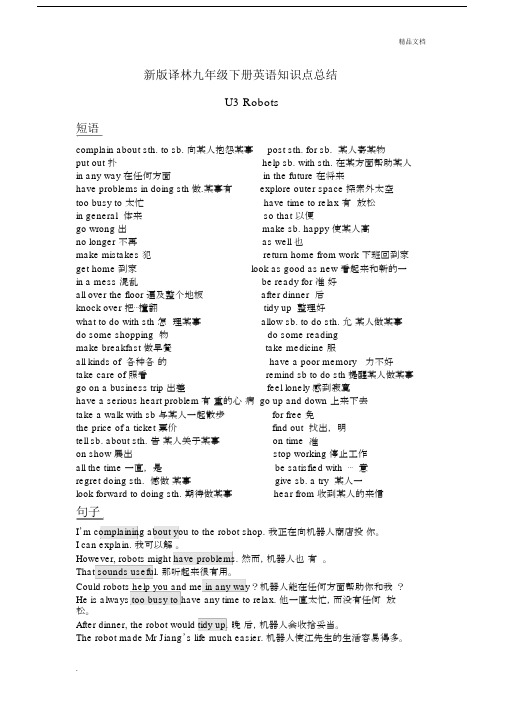
新版译林九年级下册英语知识点总结U3 Robots短语complain about sth. to sb. 向某人抱怨某事post sth. for sb. 某人寄某物put out 扑help sb. with sth. 在某方面帮助某人in any way 在任何方面in the future 在将来have problems in doing sth做.某事有explore outer space 探索外太空too busy to 太忙have time to relax 有放松in general 体来so that 以便go wrong 出make sb. happy 使某人高no longer 不再as well 也make mistakes 犯return home from work 下班回到家get home 到家look as good as new 看起来和新的一in a mess 混乱be ready for 准好all over the floor 遍及整个地板after dinner 后knock over 把⋯撞翻tidy up 整理好what to do with sth 怎理某事allow sb. to do sth. 允某人做某事do some shopping 物do some readingmake breakfast 做早餐take medicine 服all kinds of 各种各的have a poor memory 力不好take care of 照看remind sb to do sth 提醒某人做某事go on a business trip 出差feel lonely 感到寂寞have a serious heart problem有重的心病 go up and down 上来下去take a walk with sb 与某人一起散步for free 免the price of a ticket 票价find out找出,明tell sb. about sth. 告某人关于某事on time准on show 展出stop working 停止工作all the time 一直,是be satisfied with ⋯ 意regret doing sth. 憾做某事give sb. a try 某人一look forward to doing sth. 期待做某事hear from 收到某人的来信句子I’m complaining about you to the robot shop. 我正在向机器人商店投你。
九下译林英语知识点总结
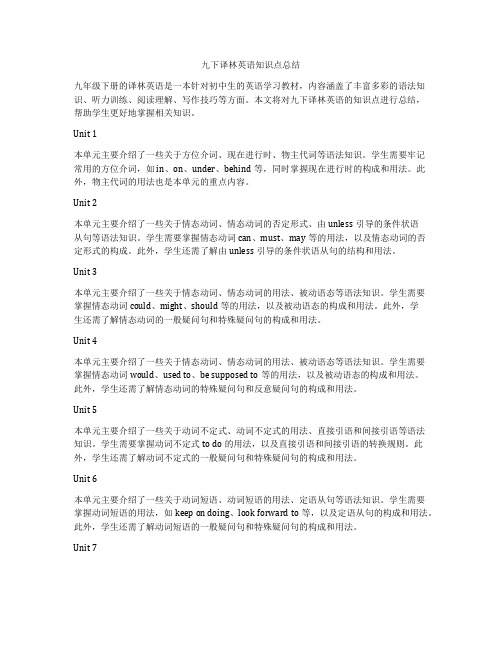
九下译林英语知识点总结九年级下册的译林英语是一本针对初中生的英语学习教材,内容涵盖了丰富多彩的语法知识、听力训练、阅读理解、写作技巧等方面。
本文将对九下译林英语的知识点进行总结,帮助学生更好地掌握相关知识。
Unit 1本单元主要介绍了一些关于方位介词、现在进行时、物主代词等语法知识。
学生需要牢记常用的方位介词,如 in、on、under、behind等,同时掌握现在进行时的构成和用法。
此外,物主代词的用法也是本单元的重点内容。
Unit 2本单元主要介绍了一些关于情态动词、情态动词的否定形式、由unless引导的条件状语从句等语法知识。
学生需要掌握情态动词can、must、may等的用法,以及情态动词的否定形式的构成。
此外,学生还需了解由unless引导的条件状语从句的结构和用法。
Unit 3本单元主要介绍了一些关于情态动词、情态动词的用法、被动语态等语法知识。
学生需要掌握情态动词could、might、should等的用法,以及被动语态的构成和用法。
此外,学生还需了解情态动词的一般疑问句和特殊疑问句的构成和用法。
Unit 4本单元主要介绍了一些关于情态动词、情态动词的用法、被动语态等语法知识。
学生需要掌握情态动词would、used to、be supposed to等的用法,以及被动语态的构成和用法。
此外,学生还需了解情态动词的特殊疑问句和反意疑问句的构成和用法。
Unit 5本单元主要介绍了一些关于动词不定式、动词不定式的用法、直接引语和间接引语等语法知识。
学生需要掌握动词不定式to do的用法,以及直接引语和间接引语的转换规则。
此外,学生还需了解动词不定式的一般疑问句和特殊疑问句的构成和用法。
Unit 6本单元主要介绍了一些关于动词短语、动词短语的用法、定语从句等语法知识。
学生需要掌握动词短语的用法,如keep on doing、look forward to等,以及定语从句的构成和用法。
此外,学生还需了解动词短语的一般疑问句和特殊疑问句的构成和用法。
九年级译林版英语知识点

九年级译林版英语知识点九年级是学习英语的关键时期,对于学生们来说,掌握好英语的知识点非常重要。
本文将为大家总结九年级译林版英语的知识点,帮助大家更好地备考和学习。
一、语法知识点1. 时态和语态在九年级英语中,学生需要掌握各种时态的用法,包括一般现在时、一般过去时、一般将来时等等。
此外,还需要了解英语中的语态,包括主动语态和被动语态的构成和使用。
2. 名词和代词名词和代词的使用也是九年级英语的重点,学生需要了解名词和代词的分类、单复数形式的变化以及在句子中的正确用法。
3. 形容词和副词形容词和副词的用法决定了句子的修饰成分,学生需要学会使用形容词和副词来描述人、物等,并了解其级比较用法以及变化规则。
4. 介词和连词介词和连词在句子中起到连接作用,帮助句子的结构更加清晰和连贯。
学生需要了解各种常见的介词和连词的用法,并能正确地使用它们构建句子。
5. 句子结构和语法转换九年级英语中,学生需要掌握不同句子结构的构成以及如何进行语法转换。
包括主从复合句、条件句、强调句等等,学生需要通过大量的练习来熟练掌握。
二、阅读技巧1. 快速阅读在九年级英语中,阅读理解是一个重要的考点。
学生需要能够快速准确地理解文章的主旨和细节信息,掌握一些快速阅读的技巧,如浏览文章首尾句、查找关键词等。
2. 推理判断在阅读理解中,学生需要能够通过对文章细节的理解和推理来回答问题。
学生需要培养自己的推理能力,通过上下文的线索来进行推测和判断。
3. 阅读策略除了理解文章内容,学生还需要掌握一些阅读策略,如寻读技巧、标注关键词、预测问题等等,这些策略有助于学生更好地理解文章并提高解题效率。
三、听力技巧1. 听力材料理解听力是英语学习中的重要组成部分,学生需要通过大量的听力训练来提高自己的听力水平。
在九年级英语中,学生需要掌握快速捕捉关键信息的技巧,如听懂主要观点和细节信息。
2. 笔记记要在听力过程中,学生可以通过记笔记的方式帮助自己更好地理解听力材料。
译林版九年级下英语各单元必考知识点汇编

译林版九年级下英语各单元必考知识点汇编【聚焦中考】:Unit1 必考知识点汇编考点一:反意疑问句Wow, the Great wall is amazing, isn’t it?哇,长城真是令人惊叹,不是吗?(教材第6页)➢中考链接1、(2014 •乌鲁木齐中考)一He’s already come back to Australia, _______?—Yes. We watched a movie together last nightA. isn’t heB. doesn’t heC. hasn’t heD. has he【答案】C【解析】考查反意疑问句。
问句中的’s是现在完成时中has的缩写形式。
根据反意疑问句的原则:前肯后否,故选C。
2、改为反意疑问句(2014 •兰州中考)Please take good care of my pet, ________?【答案】will you/won’t you考点二:since的用法,引导原因状语从句2、Since, you’re in Beijing now, why don’t you start from here?既然你现在在北京,为什么你不从这儿开始呢?(教材第7页)➢中考链接1、(2014 •安徽中考)Rick has learned a lot about Chinese culture ______ he came to China. A. before B. when C. until D. since【答案】D【解析】考查连词辨析。
句意:自从Rick来到中国,他已经学了许多中国文化。
before在……之前;when当……的时候;until直到;since自从。
since引导时间状语从句时,其主句用现在完成时,从句用一般过去时,故选D。
①I have made a lot of good friends ________ I came to this school.【答案】since3、(2015 •安徽中考)完型填空……I can say I have seen a big difference in this school 53 she came.”53. A. after B. when C. since D. before【答案】C【解析】考查连词及语境的理解。
译林版九年级下册英语unit1知识点

译林版九年级下册英语unit1知识点Unit 1: The World of Our Senses —— Exploring the Astonishing Capabilities of Our Five SensesIntroductionOur senses play a vital role in our daily lives. They allow us to experience the world around us, communicate with others, and make sense of our surroundings. In this unit, we will delve into the fascinating world of our senses and explore their astonishing capabilities.Section 1: The Power of SightOur sense of sight is arguably one of the most important senses. Through our eyes, we are able to perceive colors, shapes, and movement. However, our vision goes beyond mere observation. It is responsible for our ability to express emotions, recognize faces, and absorb information from our environment. Scientists have found that our eyes can detect approximately 10 million colors, enabling us to experience the beauty of the world in all its vibrancy.Section 2: The Magic of HearingOur sense of hearing allows us to perceive sounds and interpret them. It not only enables us to communicate with others through speech and language but also allows us to appreciate the melody of music. Fascinatingly, our ears are capable of detecting sounds as low as 20 Hz and as high as 20,000 Hz. This wide range of auditory perception is what enables us to differentiate between different pitches and tones.Section 3: The Marvel of Taste and SmellThe senses of taste and smell are closely linked and often work together to enhance our sensory experiences. Our taste buds, located on our tongues, can detect the five basic tastes: sweet, sour, salty, bitter, and umami. On the other hand, our sense of smell can detect countless odors, triggering memories and influencing our emotions. Together, taste and smell allow us to savor delicious flavors and appreciate the aromas that surround us.Section 4: The Importance of TouchOur sense of touch enables us to perceive physical sensations and textures. It plays a crucial role in our interaction with the world, providing us with information about temperature, pressure, pain, and pleasure. Our skin, which contains millions of sensory receptors, allows us to experience the sensations of softness, roughness, heat, and cold.Without our sense of touch, our perception of the world would be greatly diminished.Section 5: The Intricacies of the Sixth SenseWhile we commonly refer to the five senses, there is ongoing research into the existence of a sixth sense. This mystical sense is believed to allow us to perceive things beyond the reach of our other senses, such as sensing someone watching us when we cannot see them. While the concept of a sixth sense remains shrouded in mystery, it adds an element of intrigue to the world of our senses.ConclusionOur senses are truly captivating, allowing us to experience the wonders of the world and navigate through life. Through our eyes, ears, nose, mouth, and skin, we gain a profound understanding of our surroundings. We should take the time to appreciate and nurture our senses, as they are the key to our connection with the world and with others. So, let's embrace the incredible capabilities of our senses and continue exploring the remarkable depths of our sensory experiences.。
九年级英语译林知识点归纳
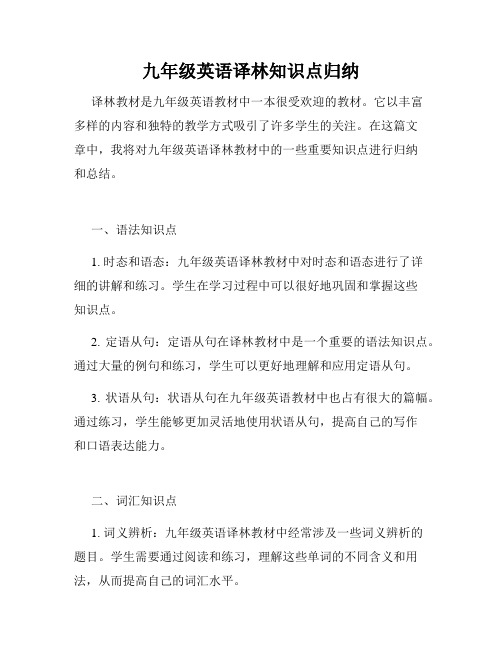
九年级英语译林知识点归纳译林教材是九年级英语教材中一本很受欢迎的教材。
它以丰富多样的内容和独特的教学方式吸引了许多学生的关注。
在这篇文章中,我将对九年级英语译林教材中的一些重要知识点进行归纳和总结。
一、语法知识点1. 时态和语态:九年级英语译林教材中对时态和语态进行了详细的讲解和练习。
学生在学习过程中可以很好地巩固和掌握这些知识点。
2. 定语从句:定语从句在译林教材中是一个重要的语法知识点。
通过大量的例句和练习,学生可以更好地理解和应用定语从句。
3. 状语从句:状语从句在九年级英语教材中也占有很大的篇幅。
通过练习,学生能够更加灵活地使用状语从句,提高自己的写作和口语表达能力。
二、词汇知识点1. 词义辨析:九年级英语译林教材中经常涉及一些词义辨析的题目。
学生需要通过阅读和练习,理解这些单词的不同含义和用法,从而提高自己的词汇水平。
2. 短语和固定搭配:译林教材中对一些常用的短语和固定搭配进行了详细的讲解和练习。
学生通过做题和自己的实际运用,能够更好地掌握这些短语和搭配的用法。
3. 词汇拓展:在九年级英语译林教材中,还有一些扩展词汇的练习题。
学生可以通过这些练习,扩大自己的词汇量,丰富自己的表达方式。
三、阅读技巧1. 细节理解:九年级英语译林教材中的阅读理解题目,会要求学生通过细节理解来回答问题。
学生需要仔细阅读文章,抓住关键信息,准确回答问题。
2. 推理判断:在译林教材中也有一些推理判断的题目。
学生需要通过综合分析和思考,进行判断,并找到正确的答案。
3. 段落主旨:阅读理解中的段落主旨题目也很常见。
学生需要理解整个段落的大意,并找到能够概括全文的主旨句。
四、写作技巧1. 段落结构:九年级英语译林教材中的写作部分,会要求学生写一篇篇章。
学生需要掌握好段落结构,注意开头、中间和结尾的过渡和衔接。
2. 连词和过渡词:在写作中,合理使用连词和过渡词能够使文章更加连贯和流畅。
学生需要通过大量的练习,来熟悉和掌握这些词语的用法。
译林九年级英语知识点

译林九年级英语知识点一、词汇1. 词义辨析:须认清单词的准确词义,避免歧义。
例如:- Economic vs. Economical:经济的 vs. 节俭的- Accept vs. Except:接受 vs. 除了2. 词形变化:需了解单词的各种形态,如名词、动词、形容词和副词等。
例如:- Conduct (v.) vs. Conduct (n.):进行 vs. 行为- Success (n.) vs. Successful (adj.):成功 vs. 成功的3. 固定搭配:掌握单词与其他词汇搭配的惯常用法。
例如:- Take part in:参加- Make up:组成二、语法1. 时态使用:正确运用各种时态表达不同的动作或状态。
例如:- Simple Present Tense:一般现在时- Present Continuous Tense:现在进行时2. 句型结构:掌握多种句型结构,以确保句子的语法准确。
例如:- If条件句:If it rains tomorrow, I will stay at home.- 定语从句:The girl who is wearing a red dress is my sister.3. 语态转换:能够进行主动语态和被动语态之间的转换。
例如:- He built the house.(主动)- The house was built by him.(被动)三、阅读1. 阅读理解:能够准确理解文章的意思,抓住关键信息。
例如:- 根据文章推断答案- 理解段落主题和结构2. 阅读技巧:灵活运用一些阅读技巧提高阅读效果。
例如:- 扫读和略读- 根据上下文猜测单词意思四、写作1. 句子写作:能够运用正确的语法和词汇组成准确的句子。
例如:- 增加句子多样性- 避免句子冗长2. 段落写作:能够组织合理的段落结构,使文章连贯。
例如:- 每段落围绕一个主题展开- 使用过渡词使段落之间衔接自然五、听力1. 听力技巧:掌握一些听力技巧提高听力理解能力。
译林初中英语知识点总结

译林初中英语知识点总结一、词汇与短语1. 基础词汇- 常见名词:学生、老师、家庭、动物、食物、颜色、数字、职业等。
- 常见动词:吃、喝、玩、学习、工作、旅行等。
- 常见形容词:高兴的、悲伤的、美丽的、丑陋的、大的、小的等。
- 常见副词:快速地、慢慢地、经常、从不等。
2. 短语搭配- 动词短语:看起来(look like)、听起来(sound like)、玩得开心(have fun)、学习英语(learn English)等。
- 介词短语:在桌子下(under the table)、在公园里(in the park)、对…感兴趣(be interested in)等。
- 常用表达:问候(Hello/Hi)、道别(Goodbye/See you)、感谢(Thank you)、道歉(Sorry)等。
二、语法结构1. 时态- 一般现在时:表示经常发生的动作或状态,如:I go to school every day.- 一般过去时:表示过去某一确定时间发生的动作或状态,如:He visited the museum last week.- 一般将来时:表示将来某一时间会发生的动作或状态,如:They will travel to Japan next year.2. 句型- 肯定句:I am a student.- 否定句:I am not a student.- 疑问句:Are you a student?- 特殊疑问句:What is your name? / Where are you from?3. 语态- 被动语态:表示动作的承受者,如:The book was written by the author.4. 非谓语动词- 动名词:作为名词使用,如:Swimming is my hobby.- 分词:作为形容词或副词使用,如:The running boy is my friend.- 不定式:作为名词、形容词、副词等,如:To err is human.三、阅读理解1. 技巧- 快速阅读:通过扫读(skimming)和略读(scanning)快速获取文章大意。
译林牛津版九年级下册英语全册知识点归纳总结(Word版)

译林牛津版九年级下册英语全册知识点归纳总结(Word版)新译林9B 英语全册知识点归纳总结9B UNIT 1 一、词汇大集合1. It says 上面写着,上面显示2. eat up 吃光,吃完(use up 用完,用尽)(代词的位置)3. be well organized 很有条理的4. keep ........ in good order使... 保持井然有序(in order按顺序)5. show off 炫耀,卖弄(show sb around sp 带领某人参观某地show sb the way to 给某人指到某地的路)6. show no interest in 对.. 毫不感兴趣7. repeat grammar rulers for us 为我们重复语法规则8. come up with (= think of 想出,提出);追上,赶上9. be curious about对…感到好奇10. get angry easily 容易生气(anger n.)11. make a good accountant 成为一名优秀的会计12. neither ....... nor ........ 既不... 也不.... (就近原则)Neither he nor I am well educatedeither ...... or ......... 或者 ... 或者.....both …… and ……两者都连接两个主语时,谓语动词用复数形式13. He didn ' t come here yesterday , neither / nor did I 他昨天没来这儿,我也是* * * 拓展:so, neither 位于分句或句子的开头,这种结构通常表示前面所说的情况也适合于另一个人(或事物),表示“我也这样”之类的概念。
* * *其句型可归纳为:so / neither + be / have / 助动词/ 情态动词+ 主语。
译林版九年级下学期全册知识点梳理

九下第一单元知识点梳理1.tiring (adj.使人疲劳的,累人的)→ tired (adj.疲倦的;困倦的)→ tire (v.使疲劳)2. raising (n.升高)→ raise (v.举起,提起;筹集;饲养)3. attraction (n.向往的地方:吸引)- attract(v.吸引)→ attractive (adj.有吸引力的;漂亮的)4. wonder(n.奇迹)→ wonderful(adj.精彩的)→ wonderfully(adv.精彩地)5. eastern (adj.东部的,东方的)→ east(n.东,东方)6. service (n.服务;工作)→ serve(v.服役;招待;服务)7. Japanese (n&adj.日本(人)的)→ Japan(n.日本)8. Indian (n&adj.印度(人)的)→ India(n.印度)1.climb the steps 爬台阶2.take a rest 休息一下3. on your way back 在你回来的途中4. in the middle of 在……中间5. watch the raising of the national flag 观看升国旗6. in a natural landscape 在自然景观中7. every few hundred metres 每隔几百米8. the wonders of the world 世界奇迹9. lie on the two sides of 位于……两边10.stand in different shapes 以不同形状耸立着11. hang down 向下悬垂12. be praised as ...被誉为……13. take a boat trip along ...坐船沿……游览14. hire a bicycle 租一辆自行车15. take up 占据(空间);占用(时间)16. three quarters of ...……的四分之三17.a 17-hole bridge 一座十七孔的桥18. provide a high level of service 提供高水平的服务19. an ancient city of culture 一座文化古城20. take a tour of ...参观/游览……21. be well worth a visit 非常值得参观22.main crops 主要作物23. a large iron and steel industry 大型钢铁工业1. It's tiring to do sth.做某事是累人的2. keep doing sth.继续/重复做某事3. on one's way back 在某人返回的路上4.Why don't you ...?你(们)为什么不……?5. used to do sth.过去常常做某事6. turn ...into...把……变成……7. on either side of ...在……的任一边8. be worth doing sth.值得做某事9. three quarters of ...……的四分之三10.think/find it + adj+ to do sth.认为/发现做某事是……的11. It's + adj,+ for sb. to do sth.对某人来说做某事是……的12. It's said that ...据说……13, leave for sp.动身去某地14.The population of……的人口15.It lies in 位于……九下第二单元知识点梳理一·词形拓展1. invent (vt.发明)→ inventor (n.发明者)→ invention (n.发明物;创意)2.explorer (n.探险者;考察者)→ explore(vt.探索;探讨)3.South African (n.南非人)→ South Africa(n.南非)4. fighter(n.斗士,战斗者;战斗机)→ fight (v.战斗;打架)5. Italian(n.意大利人)→ Italy(n.意大利)6. European(n.欧洲人)→ Europe(n.欧洲)7. Russian (n.俄罗斯人)→ Russia(n.俄罗斯)8. serve (vi.&vt.服役;服务,招待)→ service (n.服务;工作)9. further (adj.更多的,更进一步的)→ far (adj.远的)10. citizen (n.公民;市民)→city(n.城市)11. pride(n.骄傲;可引以为豪的人(或物)(→ proud (adj.骄傲的,自豪的)12. scientist (n.科学家)→ science (n.科学)13. discovery (n.发现;发现物)→ discover (v.发现)14. unknown (adj.未知的;不出名的)→ known (adj.已知的;出名的)15. widely (adv.广泛地,普遍地)→ wide (adj.宽的,宽阔的)16. hunger (n.饥饿)→ hungry (adj.饥饿的)17.advantage (n.优势,有利条件)→ disadvantage (n.劣势,不利条件)18. production (n.生产;产量)→ produce(v.生产)19. development (n.发展)→ develop(v.发展)→ developing (adj.发展中的)→ developed(adj.发达的)二·短语总结1. South African 南非人2. create over 1,000 inventions 创造了1 000 多项发明3. become interested in flying 对飞行感兴趣4. join the navy 参加海军5. go into space 进入太空6.cut ... short 缩短7. step out onto the Moon's surface 跨出走到月球的表面8. for further research 为了更进一步的研究9. by hand 手工10. not one's cup of tea (口语)非某人所爱11. die of hunger 死于饥饿12. at the age of ...在……岁时13. manage to do sth.设法做成某事14 together with sb.和某人一起15.marry sb.与某人结婚be/ get married to sh.与某人结婚16.push for the use of 推动使用……17.have advantages over 有胜于……的优势18. That's why ....那就是……的原因。
牛津译林版英语语法知识点精讲:九年级下Unit1LifeonMars

Unit 1 Life on Mars.教学内容:Unit 1 Life on Mars二.教学目标:本单元重点词汇、短语和语言点知识[来源 :21世紀教育网]【具体教学过程】、重点单词机器人n. robot 片剂,药片n. pill干缩的,干的 adj. dried想象,设想 v. imagine拥挤的 adj. crowded被污染的adj. polluted可以指望;怀希望地 adv. hopefully 人; 人的 n. & adj. human发展 v. develop移居者n. settler流行的,时髦的 adj. fashio nable各种各样的,不同的 adj. various 巩固练习:1. In summer travelers wear their s ___________________ because of the bright sunshine.2. H__ _, we can build a better world on Mars.9B Un it 1网,网络n.net 吉他n.guitar 太阳镜n.sun glasses 世纪教育网 帐篷n.tent 储藏,存储 v. store表面n. surface宇宙飞船n.spacecraft航天飞机n.space shuttle3. My friend is musical. He is good at play ing the g ____ .4. When you are ill, you should take p _______________ on time.5. It ' s great that r _______________ d o all the work for us.6. If you go camp ing, you should take a t ___________ with you.7. Fish ing n ______________ is useless on the moon.8. Last summer holiday I went to Beiji ng and I took lots of photos with my c ____9. Scientists should d __________________ plants that can grow on Mars.10. The boots will probably become f ________________________ .、重点短语1、与某人相处得好get on well with sb.2、认识某人get to kn ow sb3、被照顾be cared for4、使我不开心make me un happy5、三副太阳镜three pairs of sun glasses6、避免漂浮preve nt float ing7、连接到氧气罐be conn ected to the air tank&在星球的表面on the surface of the pla net9、至U 2100 年为止by the year 210010、越来越拥挤和受至U污染more and more crowded and polluted11、3/8的引力three-eighths of the gravity12、运送大量的人carry large nu mbers of people13、飘进太空float away into space14、不同的设计供定居者选择differe nt desig ns for settlers to choose from、课文结构和语言点知识Paragraph 1: Why we move to Mars?1. Movi ng to Mars (L.1)move :①move to搬家,搬迁他家去年搬到加拿大去了。
最新整理译林版初中英语九年级下全册单元知识点及语法总结整理.doc

最新整理译林版初中英语九年级下全册单元知识点及语法总结整理.doc...译林版初中英语九年级下册全册单元知识点及语法整理Unit1 AsiaWelcome to the unit1.一个亚洲的国家an Asian country2.爬台阶很累人It s’tiring to climb the steps3.休息一下have/take a break/rest4.有很长一段路要走There’s a long way to go5.最好继续前进had better keep moving6.把我叫醒wake me up7.在你回来的路上on your way back8.中国结Chinese knot9.中国戏曲Chinese opera10.中国剪纸Chinese paper-cutting11.一双筷子 a pair of chopsticks12.舞龙dragon dance13.一种传统的中国艺术 a traditional Chinese art14.谢谢你的建议Thank you for your advice/ suggestionsReading1中国的首都the capital of China2在这座古老的城市的中心in the middle of the ancient city3被改造成一个博物馆be turned/ changed into a museum4值得参观( 2种)be( well )worth visiting/ a visit5最大的城市广场the biggest city square6一大早聚集在那里看升国旗gather there early in the morning to watch the raising of the national flag 7横贯中国北方六千多公里run for over 6,000 kilometres across northern China8每隔几百米就有烽火台with watchtowers every few hundred metres9世界奇迹之一one of the wonders10位于漓江的两侧on both sides of Lijiang River11不同形状的矗立stand in different shapes12一个地下溶洞an underground cave13奇形怪状in unusual shapes14悬挂下来hang down15指向上方point upwards16被赞扬为。
译林版英语九年级下册U1单词讲解

9B Unit 1 Asia 单词讲解
1.tiring adj. 使人疲劳的,累人的 _t_ir__e_d_疲劳的
After a long walk, they allf_e_l_t_t_i_r_e_d_(感到累了) It wsausc_h__a__ti_r_i_n_g__t_r_itphat all of us _f_e_lt__t_ir__e.d
_a_tt_r_a_c_ti_v_e_(adj.)
The Great Wall is one of the tourist _a_t_tr_a_c_t_io_n_s. Audrey Hepburn has an _a_t_tr_a_c_t_iv_e_quality.
Whata_t_tr_a_c_t_sthe reader’s attention more, the
9B Unit 1 Asia 21. point vi. 指,指向
point at习惯上表示指向离说话人较近的事物,意为“指着”,at是介词,着重于 指的对象。
Don’t point at the words while you are reading. 读书时不要用手指着字。 point to指向,指出;主要指的是比较远的地方。 He point to the house on the other side of the river and said: " That is my house.
Unit 1 Asia知识点归纳2021-2022学年牛津译林版英语九年级下册
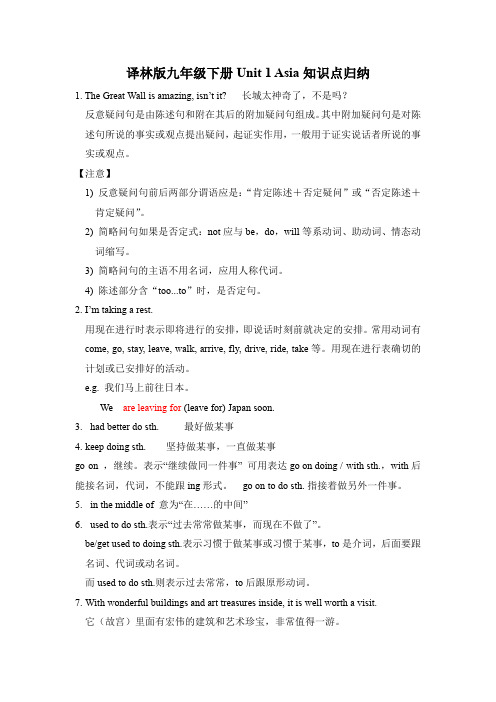
译林版九年级下册Unit 1 Asia知识点归纳1. The Great Wall is amazing, isn’t it? 长城太神奇了,不是吗?反意疑问句是由陈述句和附在其后的附加疑问句组成。
其中附加疑问句是对陈述句所说的事实或观点提出疑问,起证实作用,一般用于证实说话者所说的事实或观点。
【注意】1) 反意疑问句前后两部分谓语应是:“肯定陈述+否定疑问”或“否定陈述+肯定疑问”。
2) 简略问句如果是否定式:not应与be,do,will等系动词、助动词、情态动词缩写。
3) 简略问句的主语不用名词,应用人称代词。
4) 陈述部分含“too...to”时,是否定句。
2. I’m taking a rest.用现在进行时表示即将进行的安排,即说话时刻前就决定的安排。
常用动词有come, go, stay, leave, walk, arrive, fly, drive, ride, take等。
用现在进行表确切的计划或已安排好的活动。
e.g. 我们马上前往日本。
We are leaving for (leave for) Japan soon.3.had better do sth. 最好做某事4.keep doing sth. 坚持做某事,一直做某事go on ,继续。
表示“继续做同一件事” 可用表达go on doing/ with sth.,with后能接名词,代词,不能跟ing形式。
go on to do sth.指接着做另外一件事。
5.in the middle of 意为“在……的中间”ed to do sth.表示“过去常常做某事,而现在不做了”。
be/get used to doing sth.表示习惯于做某事或习惯于某事,to是介词,后面要跟名词、代词或动名词。
而used to do sth.则表示过去常常,to后跟原形动词。
7.With wonderful buildings and art treasures inside, it is well worth a visit.它(故宫)里面有宏伟的建筑和艺术珍宝,非常值得一游。
- 1、下载文档前请自行甄别文档内容的完整性,平台不提供额外的编辑、内容补充、找答案等附加服务。
- 2、"仅部分预览"的文档,不可在线预览部分如存在完整性等问题,可反馈申请退款(可完整预览的文档不适用该条件!)。
- 3、如文档侵犯您的权益,请联系客服反馈,我们会尽快为您处理(人工客服工作时间:9:00-18:30)。
新版译林九年级下册英语知识点总结U1 Asia重点短语take a rest 休息on one’s way back 在某人回来的路上had better(not)do sth. 最好不做某事wake sb. up 叫醒某人keep doing sth. 继续做某事go on 继续Chinese paper-cutting 中国剪纸plan to do sth. 计划做某事be worth doing sth. 值得做某事welcome to…欢迎到…the raising of the national flag 升国旗仪式one of…其中之一the capital of…的首都used to do sth. 过去常常做某事so many 如此多的turn…into…把…变成….take a boat trip坐船旅行next to 贴近have/has been to 到过take up 占据(空间)feel cold 感到冷be different from 与…不同arrive in/at 到达rain cats and dogs 倾盆大雨be far away from 远离be/get used to doing sth. 习惯做某事as…as 和…一样ask sb. to do sth. 要求某人做某事on the third day 在第三天set out 出发for example 例如look down 看不起,俯视nod one’s head 点头shake one’s head 摇头communicate with sb. 与某人交流be famous for 因…而出名句子The Great wall is amazing, isn’t it?长城真是令人惊叹,不是吗?We’d better keep moving.我们最好继续前进。
Since you are in Beijing now, why don’t you start from here?既然你现在在北京,为什么你不从这儿开始呢?The Emperors of the Ming and Qing Dynasties used to live here.明朝和清朝的皇帝们过去居住在这里It runs for over 6,000 kilometers across northern China, with watchtowers every few hundred meters.它穿越中国的北部,有6000多公里长,每几百米就设有瞭望台。
It is one of the wonders of the world.它是世界奇观之一。
It lies on the two sides of Lijiang River.它位于漓江的两岸。
I hope you can visit my city one day!我希望有一天你能参观我的城市。
But I don’t think the pollution is as serious as I imagined.但是我想污染没有我想象的严重。
Most people can speak both English and Chinese.大多数人能说英语和汉语。
So it is not too difficult to communicate with the local people.所以和当地居民交流不是很困难。
U2 Great people短语hear of/about 听说all one’s life 一生the rights of …的权利be born 出生cut short 缩短become interested in 对…产生兴趣together with sb. 与某人一起manage to do sth. 设法做某事because of 由于for the first time 第一次the pride of …的骄傲on the/one’s way back to 在回…的路上allow sb. to do sth. 允许某人做某事begin doing sth. 开始做某事out of control 失去控制do the housework 做家务on the phone 通过电话 a pair of trainers一双运动鞋write to 写信给make a great difference 有很大区别help sb (to) do sth. 帮助某人做某事in a few minutes 过几小时后have time to do sth 有时候做某事practice doing sth. 练习做某事be from 来自get married 结婚share sth with sb. 和某人分享某物believe it or not 信不信由你a member of…的成员graduate…from…从…毕业see sb. do sth. 看见某人做某事spend…on…花费在…上句子I’ve never heard of him.我从来没有听说过他。
Armstrong joined the navy in 1949 and served as a pilot for three years.阿姆斯特朗在1949年参加海军,并作为飞行员服役三年。
Armstrong received the order to cut the flight short.阿姆斯特朗接到命令缩短飞行。
However,on their way back to the Earth, the spacecraft began spinning out of control.然而,在他们返回地球的途中,宇宙飞船开始迅速旋转,失去了控制。
He was the pride of the whole world.他是全世界的骄傲。
Simon was playing computer games while Millie was watching TV.西蒙正在玩游戏,而米莉正在看电视。
In 1960,he saw people die of hunger, so he began research into hybrid rice. 在1960年,他看到人们死于饥饿,所以他开始研究杂交水稻。
U3 Robots短语complain about sth. to sb. 向某人抱怨某事post sth. for sb. 为某人寄某物put out 扑灭help sb. with sth. 在某方面帮助某人in any way 在任何方面in the future 在将来have problems in doing sth.做某事有问题explore outer space 探索外太空too busy to 太忙have time to relax 有时间放松in general 总体来说so that 以便go wrong 出错make sb. happy 使某人高兴no longer 不再as well 也make mistakes 犯错误return home from work 下班回到家get home 到家look as good as new 看起来和新的一样in a mess 混乱be ready for准备好all over the floor 遍及整个地板after dinner 饭后knock over 把…撞翻tidy up 整理好what to do with sth 怎样处理某事allow sb. to do sth. 允许某人做某事do some shopping 购物do some reading 阅读make breakfast 做早餐take medicine 服药all kinds of 各种各样的have a poor memory 记忆力不好take care of 照看remind sb to do sth 提醒某人做某事go on a business trip 出差feel lonely 感到寂寞have a serious heart problem 有严重的心脏病go up and down 上来下去take a walk with sb 与某人一起散步for free 免费the price of a ticket 票价find out 找出,查明tell sb. about sth. 告诉某人关于某事on time 准时on show 展出stop working 停止工作all the time 一直,总是be satisfied with 对…满意regret doing sth. 遗憾做过某事give sb. a try 给某人一试look forward to doing sth. 期待做某事hear from 收到某人的来信句子I’m complaining about you to the robot shop.我正在向机器人商店投诉你。
I can explain. 我可以解释。
However, robots might have problems.然而,机器人也许有问题。
That sounds useful. 那听起来很有用。
Could robots help you and me in any way?机器人能在任何方面帮助你和我吗?He is always too busy to have any time to relax.他一直太忙,而没有任何时间放松。
After dinner, the robot would tidy up.晚饭后,机器人会收拾妥当。
The robot made Mr Jiang’s life much easier.机器人使江先生的生活容易得多。
His flat would look as good as new, and a delicious dinner would be ready for him. 他的公寓看起来完美如新,一份丰盛的晚餐将为他准备好。
It seemed that in general the robot satisfied Mr Jiang’s needs.似乎总体来说机器人满足江先生的需要。
The robot caught a virus and no longer worked properly.机器人中了病毒,不再正确的工作了。
When Mr. Jiang got home, he would find his flat in a complete mess.当江先生回家时,他会发现他的公寓混乱不堪。
